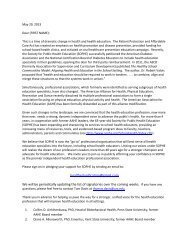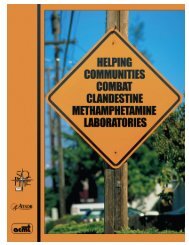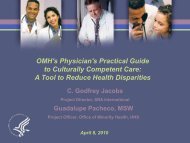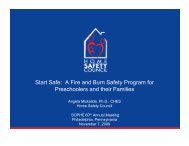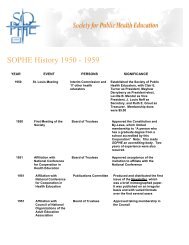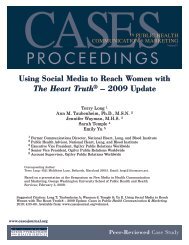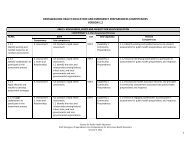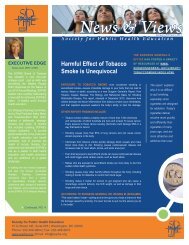Download - Society for Public Health Education
Download - Society for Public Health Education
Download - Society for Public Health Education
- No tags were found...
You also want an ePaper? Increase the reach of your titles
YUMPU automatically turns print PDFs into web optimized ePapers that Google loves.
Conference AbstractsConcurrent Session C3Quality Assurance in <strong>Health</strong> <strong>Education</strong>:Addressing the Multiple Determinants ofProfessional Preparation & PracticeRoom: Studio BQuality Assurance in <strong>Health</strong><strong>Education</strong>: Levers <strong>for</strong> ChangeDavid Birch, PhD, CHES, Department of <strong>Health</strong>Science, University of AlabamaOver the past decade, three sequential national task <strong>for</strong>ceshave collaborated with the <strong>Society</strong> <strong>for</strong> <strong>Public</strong> <strong>Health</strong> <strong>Education</strong>(SOPHE), the American Association <strong>for</strong> <strong>Health</strong> <strong>Education</strong>(AAHE), the Council <strong>for</strong> <strong>Education</strong> <strong>for</strong> <strong>Public</strong> <strong>Health</strong> (CEPH) andthe National Commission <strong>for</strong> <strong>Health</strong> <strong>Education</strong> Credentialing,Inc. (NCHEC) to provide leadership in improving qualityassurance in professional preparation in health education.The collaborative work of the three task <strong>for</strong>ces has played animportant role in initiating changes in both the accreditationof health education professional preparation programs andthe certification of health education specialists. These changesinclude CEPH accreditation of baccalaureate communityhealth education programs outside of schools of publichealth that are co-located in a unit with a master’s program inpublic/community health education, revisions in the SOPHE/AAHE Baccalaureate Program Approval Committee (SABPAC),and the initiation of the Master Certified <strong>Health</strong> <strong>Education</strong>Specialist (MCHES) credential in 2011. While much progress hasbeen made, several important quality assurance tasks must beaddressed by the current task <strong>for</strong>ce. These tasks include theexpansion of accreditation to “free-standing” baccalaureatepublic/community health education programs, the initiationof an accreditation process <strong>for</strong> master’s-level school healtheducation professional preparation programs, and the linkagebetween eligibility <strong>for</strong> the Certified <strong>Health</strong> <strong>Education</strong> Specialist(CHES) exam and graduation from an accredited program. Thepurpose of this session is to present a brief overview of recentaccomplishments related to quality assurance, describe currentand future directions <strong>for</strong> engaging and in<strong>for</strong>ming stakeholders,identify research priorities related to quality assurance, andpresent progress on ongoing quality assurance initiatives.Obtaining CEPH Undergraduate Accreditationin Community <strong>Health</strong>: Observations on thePreparation, Process and BenefitsR. Daniel Duquette, EdD, CHES, University of Wisconsin - LaCrosseIn 2005 the Council <strong>for</strong> <strong>Education</strong> <strong>for</strong> <strong>Public</strong> <strong>Health</strong> (CEPH)revised its criteria <strong>for</strong> accreditation at the undergraduatelevel. For the first time, CEPH criteria <strong>for</strong> accreditationenabled undergraduate public/community health educationprograms outside of schools of public health to be reviewed<strong>for</strong> accreditation as long as they are co-located with amaster’s program in public/community health education.The University of Wisconsin-La Crosse, Department of<strong>Health</strong> <strong>Education</strong> and Promotion, has maintained CEPHaccreditation of its Master of <strong>Public</strong> <strong>Health</strong> in Community<strong>Health</strong> <strong>Education</strong> program since 1992. Recently thedepartment became one of the first undergraduatecommunity health education programs outside of a schoolof public health to be accredited by CEPH. The purposeof this session is to present the rationale <strong>for</strong> seeking CEPHMCHES Sessionsaccreditation <strong>for</strong> the undergraduate program, the departmentplanning and preparation related to the accreditationprocess, the faculty perceptions of the accreditationexperience and the perceived benefits of accreditation.Quality Assurance in Professional Preparationat the Baccalaureate Level: A CEPH UpdateLaura Rasar King, MPH, CHES, Council on<strong>Education</strong> <strong>for</strong> <strong>Public</strong> <strong>Health</strong>The Council on <strong>Education</strong> <strong>for</strong> <strong>Public</strong> <strong>Health</strong> (CEPH), thefederally-recognized accrediting agency <strong>for</strong> public health,has historically has focused on graduate-level professionalpreparation in public health, including community healtheducation. For the last several years, however, CEPH has beenconsidering quality assurance issues at the baccalaureatelevel of training. Baccalaureate programs in communityhealth education were among the first undergraduate degreeprograms in public health to be developed, and communityhealth educators were among the first public healthprofessionals to be prepared and practice public health at thatdegree level. Recently, CEPH has made progress in planning <strong>for</strong>the accreditation of free-standing bachelor’s degrees in publichealth, including those in community health education. Thissession will provide a discussion of those recent developments.Leveraging Certification as a Quality AssuranceMechanism <strong>for</strong> Systems ChangeLinda Lysoby, MS, MCHES, CAE, National Commission<strong>for</strong> <strong>Health</strong> <strong>Education</strong> Credentialing, Inc.Changes in our national health priorities require a focus onprevention. Maximizing system change to accommodate thesepriorities requires a trained and competent health educationwork<strong>for</strong>ce. The nationally recognized Certified <strong>Health</strong><strong>Education</strong> Specialist (CHES) credential, in existence <strong>for</strong> 20years and held by over 9,200 current active individuals, is onemeasure of professional competence of the health educationwork<strong>for</strong>ce. In addition, the National Commission <strong>for</strong> <strong>Health</strong><strong>Education</strong> Credentialing, Inc (NCHEC) inaugurated a MasterCertified <strong>Health</strong> <strong>Education</strong> Specialist (MCHES) credential in 2011.Both certifications have 3 components: academic preparation,passing a certification assessment, and then maintainingcontinuing education requirements. In addition, the MCHESeligibility requires 5 years of health education experience.The <strong>Health</strong> Educator Job Analysis Project-2010 (HEJA) studywas a joint collaboration with The <strong>Society</strong> <strong>for</strong> <strong>Public</strong> <strong>Health</strong><strong>Education</strong> (SOPHE), the American Association <strong>for</strong> <strong>Health</strong><strong>Education</strong> (AAHE), and NCHEC to validate the contemporarypractice and framework of health education specialists. TheCHES and MCHES certifications are based upon the verifiedcompetencies required in the practice setting documented bythe results of the (HEJA) and the Competency Update Project(CUP), both of which identified multiple levels of practice,entry and advanced-level, <strong>for</strong> health education specialists.Both exams cover the 7 Areas of Responsibility and 34Competencies. The CHES exam covers 162 Sub-competencies.The MCHES exam covers all 223 Sub-competencies, includingthe 61 additional advanced-level Sub-competencies. Reportsof the exam results are provided to individuals who take theexam and aggregated <strong>for</strong> academic programs of all graduatewho took the exam. Implications of these reports on boththe individual and professional preparation program levels toimprove the health education work<strong>for</strong>ce will be discussed.SOPHE 62nd Annual Meeting29




